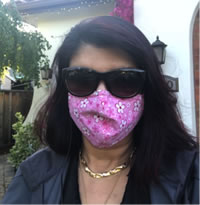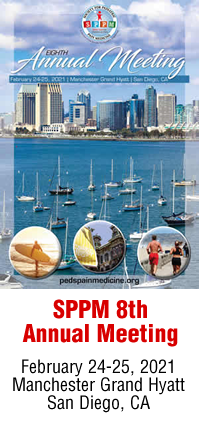President's Message
Presidential Address - Summer 2020
By Rita Agarwal, MD, FAAP, FASA
Clinical Professor of Anesthesiology
Stanford School of Medicine
Stanford, California
 |
Dr. Agarwal |
I wrote my last President’s message on February 7. We were excited and happy about the upcoming Seventh Annual SPPM Meeting in the Bahamas. We had no idea then how dramatically our world was going to change in the next few weeks.
Although many of us had heard about COVID-19, we were hopelessly naïve about this emerging virus that had just reached the USA. I am so glad we were able to put on a magnificent and wonderful three-day meeting, that was well attended and well received. My sincerest thanks to Drs. Suleman, Wiktor, and Wilder; Dr. Lee, the Education Committee, Kim Battle, Jenny Patterson and Stewart Hinckley from Ruggles, and all the people involved in its success. While planning is ongoing for the 2021 SPPM Annual Meeting, none of us know what shape that will take. I personally hope that at least some, if not all of it will be in person.
This is a difficult message to write. Many of our great plans and hopes have been put on hold while so many of us battle this pandemic, care for our patients, and face new challenges at home. The last few months have been intense to say the least. The future is more uncertain now than at any time in my memory, and yet I am constantly inspired by the everyday heroes I know and work with.
Outpatient pain providers were discovering innovative methods of seeing patients, mastering telehealth platforms, and billing effectively in the face of HIPPA regulations. Meanwhile, our inpatient teams safely navigated hospital rounds, and our colleagues in the operating rooms and interventional suites masterfully created and adapted to new operating room policies to ensure maximum safety for patients and personnel. Let’s not even mention the providers with school-aged children of their own who suddenly had to make new day care arrangements and help their children with online schooling. And now just as we feel that things should be improving, we appear to be facing new surges in many parts of the country and are seeing a strange new post-COVID-19 inflammatory syndrome in children.
SPPM has created a resource page for pain related COVID-19 materials which we try to keep updated with relevant material. Suggestions for new articles are always welcome: https://www.pedspainmedicine.org/sppm-covid19-message/.
The implications of the newly described systemic inflammatory syndrome in children, and encephalopathy are only now being recognized, and may have significant impact for our patients. SPA put on an excellent virtual town hall on COVID-19 which can be viewed here: https://s3.amazonaws.com/societyhq.rsc/SPA/COVIDTownHall/zoom_02.mp4
We know we have many more months to go and, I hope by my next President’s Message, I will have a more upbeat and optimistic message. We know that #WeAreAllInThisTogether.
I, like most of you, was horrified by the brutal killing of George Floyd by police officers in Minneapolis. I joined with the SPA leadership in crafting a message on racial justice and equity: https://www.pedsanesthesia.org/spa-statement-on-solidarity/ To put it simply, no statement is enough. I know that the SPA, under the leadership of the Committee on Diversity, Equity and Inclusion is investigating ways to increase outreach and education. I want to take a minute to talk about another horrific killing that as a mother and a physician chills me to my core.
Elijah McClain was a 23-year-old, slight, “different”, young man. He was a vegetarian and violin player who volunteered at the local animal shelter. He was killed last year for wearing a mask. The irony of that in this time should not go unnoticed. The video of this incident is brutal and disturbing. https://www.youtube.com/watch?v=s78szANlt-c.
This young man who probably (in my opinion as a non-psychologist) suffered from social anxiety, was killed for walking home from the convenience store. He was thrown to the ground and held down by three police officers. He sounds terrified, but politely keeps telling the officers his name, who he is, that he is an introvert, that he doesn’t “do violence” and that he is different. He apologizes for repeatedly vomiting, while the officers tell him to stop. They then tell the EMS to give him ketamine to calm him down. We can’t see what he is doing, perhaps he is struggling, perhaps he is posing a real and immediate threat, but we CAN hear him politely talking, telling them the following: he can’t breathe, he’s sorry, they are doing a great job, they are phenomenal, he will do anything to be a better man, asking why he is being attacked, he is just trying to go home.
After then repeatedly vomiting, he received a devastating 8mg/kg of ketamine. As a mother of three young brown men and someone who lived and worked in Colorado, I find myself particularly affected by this video and situation. We must never accept this as tolerable. We must never accept this as tolerable. We must do everything in our power to combat racism, ignorance and bigotry. Many of us care for “different” young people from all races, creeds and backgrounds. We see their anxiety and fear, we hear their stories and we know that people do not respond to stress, confrontation and anxiety in the same way.
There is a clear need for increased mental health training and expertise for law enforcement and EMS services, who should have never administered any, let alone such a large dose of ketamine. Ketamine is considered such a safe drug that people with minimal training administer it ignorantly, arbitrarily, thoughtlessly and without appreciation for any of its side effects. Educating the public and other health care providers regarding its very real risks and complications is something many of us can start doing on a local, regional and national level. Educating law enforcement and EMS on social anxiety and other mental health issues is critically important for mental health experts. The situation with Elijah McClain should NEVER have happened, and it is simply unconscionable. Lest anyone think otherwise, I fully support our law enforcement officers. They have very difficult jobs, necessitating snap judgments with limited information and colored by their experiences, biases and culture.
Recent studies show that the police killings of unarmed black Americans have immediate and long lasting mental health impacts on the well-being of black adults.1,2.3 Adolescents and children are impacted by police violence in multiple ways that are clearly delineated in an excellent article in Pediatrics: Police, Equity and Health by Dr. Rhea Boyd and colleagues.3 Exposure to racial profiling, police violence, and caregiver encounters with law enforcement can all increase the incidence of anxiety, depression, PTSD, migraines, asthma, substance abuse and a host of mental and physical health issues. Black people are three times more likely to be killed by law enforcement than white people, and 1 in 1000 black males will be killed by law enforcement4. “That unpredictable but persistent possibility is a debilitating burden unfairly and disproportionately borne by black men, women, children, and families. This population of black Americans—those who indirectly grieve and remain vigilant and vulnerable to the possibility of police violence—is inadequately described in the scientific literature.”2
We must do better. We all have a role in improving public health, combating racial and social injustice, educating the public/law enforcement/healthcare professionals and improving care for our patients.
Stay safe, wear a mask, and continue to provide excellent care for your patients. Here’s hoping for a brighter future.
#blackLivesMatter
#WeAreAllInThisTogether
References
- Police, Equity, and Child Health. Boyd RW, Ellison AM, Horn IB.Pediatrics. 2016 Mar;137(3):e20152711. doi: 10.1542/peds.2015-2711. Epub 2016 Feb 1.PMID: 26908673.
- Police violence and the built harm of structural racism. Boyd RW.Lancet. 2018 Jul 28;392(10144):258-259. doi: 10.1016/S0140-6736(18)31374-6. Epub 2018 Jun 21.PMID: 29937191.
- Police killings and their spillover effects on the mental health of black Americans: a population-based, quasi-experimental study. Bor J, Venkataramani AS, Williams DR, Tsai AC. Lancet. 2018 Jul 28;392(10144):302-310. doi: 10.1016/S0140-6736(18)31130-9. Epub 2018 Jun 21.PMID: 29937193.
- Stolen Breaths. Hardeman RR, Medina EM, Boyd RW.N Engl J Med. 2020 Jun 10. doi: 10.1056/NEJMp2021072. Online ahead of print.PMID: 32521156.




